有关as作连词的用法
as的用法和例句
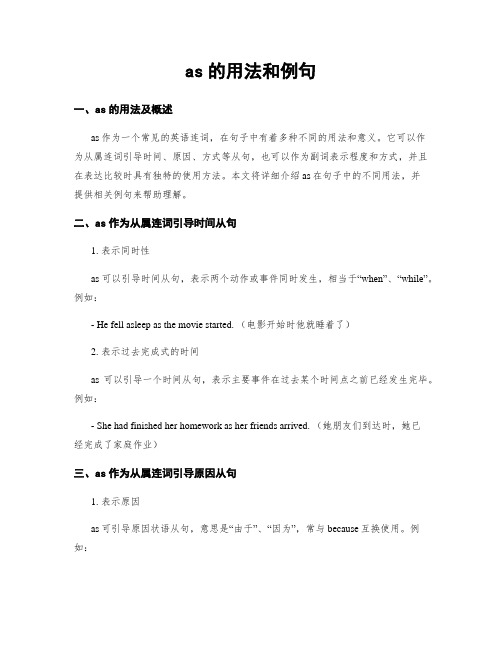
as的用法和例句一、as的用法及概述as作为一个常见的英语连词,在句子中有着多种不同的用法和意义。
它可以作为从属连词引导时间、原因、方式等从句,也可以作为副词表示程度和方式,并且在表达比较时具有独特的使用方法。
本文将详细介绍as在句子中的不同用法,并提供相关例句来帮助理解。
二、as作为从属连词引导时间从句1. 表示同时性as可以引导时间从句,表示两个动作或事件同时发生,相当于“when”、“while”。
例如:- He fell asleep as the movie started. (电影开始时他就睡着了)2. 表示过去完成式的时间as可以引导一个时间从句,表示主要事件在过去某个时间点之前已经发生完毕。
例如:- She had finished her homework as her friends arrived. (她朋友们到达时,她已经完成了家庭作业)三、as作为从属连词引导原因从句1. 表示原因as可引导原因状语从句,意思是“由于”、“因为”,常与because互换使用。
例如:- As it was raining heavily, we decided to stay indoors. (由于下大雨,我们决定待在室内)四、as作为从属连词引导方式从句1. 表示方式as可以引导方式状语从句,意思是“按照”、“以…方式”,相当于“the way”。
例如:- Please fold the clothes as I showed you. (请按我给你展示的方法叠衣服)五、as作为副词表示程度和方式1. 表示程度as可以用来表示程度或数量,有着“如同”、“像”之义。
例如:- She eats as much as her brother does. (她吃得跟她哥哥一样多)2. 表示方式as也可用来表示某种特定的方式或手段。
例如:- We have to do it as quickly as possible. (我们必须尽可能快地完成它)六、as在比较中的使用1. 表示两者之间相似性as常被用来进行比较,表示两个事物在某些方面的相似性。
as用法

一、as作连词的用法
• 3、as用作连词引导原因状语从句 as,because,since都可以表示因果关系,连 接原因状语从句,含义是"因为,由于",但 它们有区别:because表示的语气最强;as一 般放在句首,语气较弱,较口语化;since常 常用在书面语中,表示多为对方已知的、或 稍加分析便可得知的原因,有时可译作"既然 "。
五、含as的固定词组的用法
• 4. as to作“关于,至于”解 例如: There is no doubt as to his honesty.他的诚实是 无可置疑的。
五、含as的固定词组的用法
• 5. as much/many as作“多达...”,“达 到...之多”解。 例如: He can earn as much as 5000 dollars a month.他 每月能挣5000美元。
五、含as的固定词组的用法
• 6. so/as far as I know作“就我所知”解,在句 中作插入语。 例如: As/So far as I know, he will come here next Monday.据我所知,他 将于下星期一到这里来。
五、含as的固定词组的用法
• 7. as a result,as a result of表示“由于...的 结果”。 例 如: She died as a direct result of the accident. 她的死是那次事故的直接结果。
Transitional Page
一、as作连词的用法
一、as作连词的用法
1. as...as的用法 as...as意为"和……一样", 表示同级的比较。使用时要注意第一个as 为副词,第二个as为连词。 其基本结构 为:as+ adj./ adv. +as。
As的用法大全
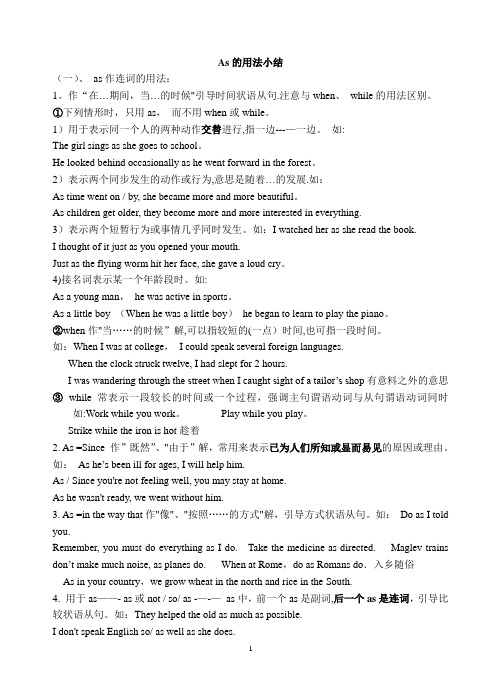
As的用法小结(一)、as作连词的用法:1。
作“在…期间,当…的时候"引导时间状语从句.注意与when、while的用法区别。
①下列情形时,只用as,而不用when或while。
1)用于表示同一个人的两种动作交替进行,指一边---—一边。
如:The girl sings as she goes to school。
He looked behind occasionally as he went forward in the forest。
2)表示两个同步发生的动作或行为,意思是随着…的发展.如:As time went on / by, she became more and more beautiful。
As children get older, they become more and more interested in everything.3)表示两个短暂行为或事情几乎同时发生。
如:I watched her as she read the book.I thought of it just as you opened your mouth.Just as the flying worm hit her face, she gave a loud cry。
4)接名词表示某一个年龄段时。
如:As a young man,he was active in sports。
As a little boy (When he was a little boy)he began to learn to play the piano。
②when作"当……的时候”解,可以指较短的(一点)时间,也可指一段时间。
如:When I was at college,I could speak several foreign languages.When the clock struck twelve, I had slept for 2 hours.I was wandering through the street when I caught sight of a tailor’s shop有意料之外的意思③while常表示一段较长的时间或一个过程,强调主句谓语动词与从句谓语动词同时如:Work while you work。
As用法总结

As用法总结一、as作连词的用法1. as...as的用法as...as意为"和……一样",表示同级的比较。
使用时要注意第一个as为副词,第二个as为连词。
其基本结构为:as+ adj./ adv. +as。
例如:(1)This film is as interesting as that one.(2)Your pen writes as smoothly as mine.其否定式为not as/so +adj./ adv. +as。
例如:This dictionary is not as/so useful as you think.若有修饰成分,如twice, three times, half, a quarter等,则须置于第一个as之前。
例如:Your bag is twice as expensive as mine.你的袋子比我的贵一倍。
几个关于as...as的常见句型:(1)as...as possiblePlease answer my question as soon as possible.(2)as...as usual/beforeShe looks as pretty as before.她看起来和以前一样漂亮。
(3)as long as... (引导条件状语从句)It took us as long as three years to carry out the plan.我们花了长达三年的时间才完成这项计划。
(4)as far asHe walked as far as the railway station yesterday evening.昨天傍晚,他一直散步到火车站。
(5)as well asShe cooks as well as her mother does.她烧菜烧得跟她母亲一样好。
一些带有as...as结构的常见短语归纳:as busy as a bee像蜜蜂一样忙碌as easy as ABC像ABC一样容易as deep as a well像井一样深as light as a feather像羽毛一样轻as soft as butter像黄油一样软as rich as a Jew像犹太人一样富裕2. as用作连词引导时间状语从句as与when,while都是引导时间状语从句的从属连词,含义都是"当……的时候"。
as作连词的用法总结

as作连词的用法总结一、as作连词的用法as做连词主要引导状语从句1. as...as的用法as...as意为"和……一样",表示同级的比较。
使用时要注意第一个as为副词,第二个as为连词。
其基本结构为:as+ adj./ adv. +as。
例如:(1)This film is as interesting as that one.这部电影和那部电影一样有趣。
(2)Your pen writes as smoothly as mine.你的钢笔书写起来和我的一样流畅。
其否定式为not as/so +adj./ adv. +as。
例如:This dictionary is not as/so useful as you think.这本字典不如你想象的那样有用。
若有修饰成分,如twice, three times, half, a quarter 等,则须置于第一个as之前。
例如:Your bag is twice as expensive as mine.你的袋子比我的贵一倍。
几个关于as...as的常见句型:(1)as...as possiblePlease answer my question as soon as possible.请尽快回答我的问题。
(2)as...as usual/beforeShe looks as pretty as before.她看起来和以前一样漂亮。
(3)as long as... (引导条件状语从句)It took us as long as three years to carry out the plan.我们花了长达三年的时间才完成这项计划。
(4)as far asHe walked as far as the railway station yesterday evening.昨天傍晚,他一直散步到火车站。
(5)as well asShe cooks as well as her mother does.她烧菜烧得跟她母亲一样好。
as作为连词的用法归纳总结

as作为连词的用法归纳总结
1. 当 as 表示“当……的时候”,就像我们说“当我看到那美景,哇,真的超级震撼”,比如“As I was walking in the park, I saw a beautiful flower.”。
2. 它还能表示“因为”呢,就好像“因为他努力,所以取得好成绩”,看这个例子“As he worked hard, he got good grades.”。
3. 嘿,as 还可以表示“像……一样”哦,比如“她跳舞像蝴蝶一样优美”,那就是“She dances as gracefully as a butterfly.”。
4. 哇塞,as 还能在比较级里出现呢,就如同“他跑得比我快”,“He runs faster than me as expected.”。
5. 告诉你哦,as 也能表示“虽然”,这就像“虽然很累,但还是坚持”,“Tired as he was, he still persisted.”。
6. 最后呢,as 有时候还可以表示“按照”呀,好比“按照要求去做”,“Do it as required.”。
总之,as 的用法可真是多种多样啊,大家要好好掌握哦!。
as作连词的用法

as作连词的用法As用作连词可以引导时间状语从句、原因状语从句、让步状语从句、方式状语从句、比较状语从句、定语从句和结果、目的状语,我们在学习过程中应注意辨别。
一、时间状语从句as引导的时间状语从句多用于口语,强调主句和从句的动作同时发生或一前一后发生,意为随着……、一边……一边……有时可以和when和while互换,意为当……的时候。
如:As time went on,her hair became grey.I read the letter as I walked along the river.As(when he was) a small boy, he began to learn EnglishAs (While) the teacher is explaining the text,the students are taking notes.二、原因状语从句as引导原因状语从句,意为由于……鉴于……语气比because、since弱,表示明显的或已为对方所熟悉的原因,一般放在主句之前。
如果放在主句之后,则表示对主句附加说明。
如:As it is raining hard,we won’t go out.We a11 1ike her as she is kind.As he was in hurry, he left his bag at home.三、让步状语从句as引导让步状语从句,意为虽然,尽管,通常从句要用倒装,即从句的表语/状语放在as之前。
如果从句中表语是单数名词,那么名词前不加冠词。
如:Young as he is,he knows a lot.(young作表语)Hard as he works,he has made little progress.(hard作状语)Child as he is,he knows a lot.(child前不加冠词)四、方式状语从句as作方式状语,意为正如、按照、如同、像。
As的用法
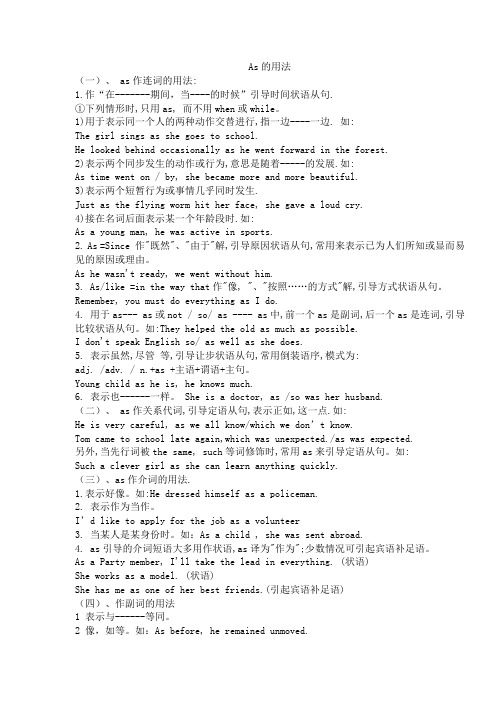
As的用法(一)、 as作连词的用法:1.作“在-------期间,当----的时候”引导时间状语从句.①下列情形时,只用as, 而不用when或while。
1)用于表示同一个人的两种动作交替进行,指一边----一边. 如:The girl sings as she goes to school.He looked behind occasionally as he went forward in the forest.2)表示两个同步发生的动作或行为,意思是随着-----的发展.如:As time went on / by, she became more and more beautiful.3)表示两个短暂行为或事情几乎同时发生.Just as the flying worm hit her face, she gave a loud cry.4)接在名词后面表示某一个年龄段时.如:As a young man, he was active in sports.2. As =Since 作"既然"、"由于"解,引导原因状语从句,常用来表示已为人们所知或显而易见的原因或理由。
As he wasn't ready, we went without him.3. As/like =in the way that作"像, "、"按照……的方式"解,引导方式状语从句。
Remember, you must do everything as I do.4. 用于as--- as或not / so/ as ---- as中,前一个as是副词,后一个as是连词,引导比较状语从句。
如:They helped the old as much as possible.I don't speak English so/ as well as she does.5. 表示虽然,尽管等,引导让步状语从句,常用倒装语序,模式为:adj. /adv. / n.+as +主语+谓语+主句。
as as的用法总结例句
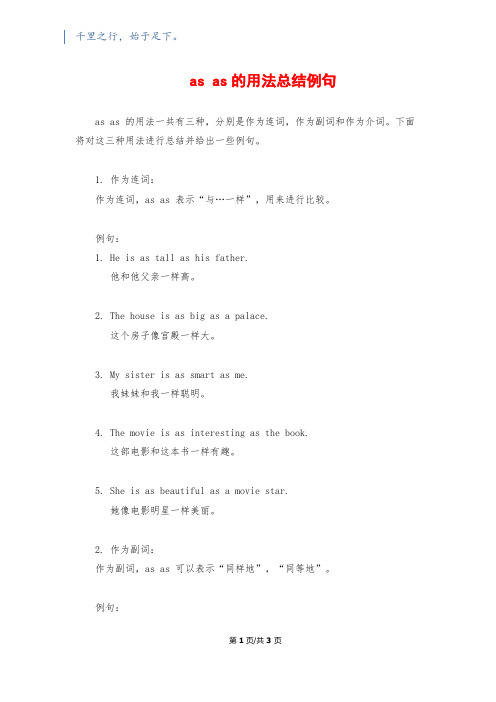
千里之行,始于足下。
as as的用法总结例句as as 的用法一共有三种,分别是作为连词,作为副词和作为介词。
下面将对这三种用法进行总结并给出一些例句。
1. 作为连词:作为连词,as as 表示“与…一样”,用来进行比较。
例句:1. He is as tall as his father.他和他父亲一样高。
2. The house is as big as a palace.这个房子像宫殿一样大。
3. My sister is as smart as me.我妹妹和我一样聪明。
4. The movie is as interesting as the book.这部电影和这本书一样有趣。
5. She is as beautiful as a movie star.她像电影明星一样美丽。
2. 作为副词:作为副词,as as 可以表示“同样地”,“同等地”。
例句:第1页/共3页锲而不舍,金石可镂。
1. She works as hard as her colleagues.她和她的同事一样努力工作。
2. He drives as carefully as his wife.他开车和他的妻子一样小心。
3. We need to save money as much as possible.我们需要尽可能地节省钱。
4. Please answer the questions as quickly as you can.请尽快回答这些问题。
5. He speaks English as fluently as a native speaker.他讲英语和母语者一样流利。
3. 作为介词:作为介词,as as 表示“作为…”。
例句:1. He works as a doctor in a hospital.他在医院里当医生。
2. She sees herself as a talented musician.她把自己看做一个有才华的音乐家。
As的用法大全
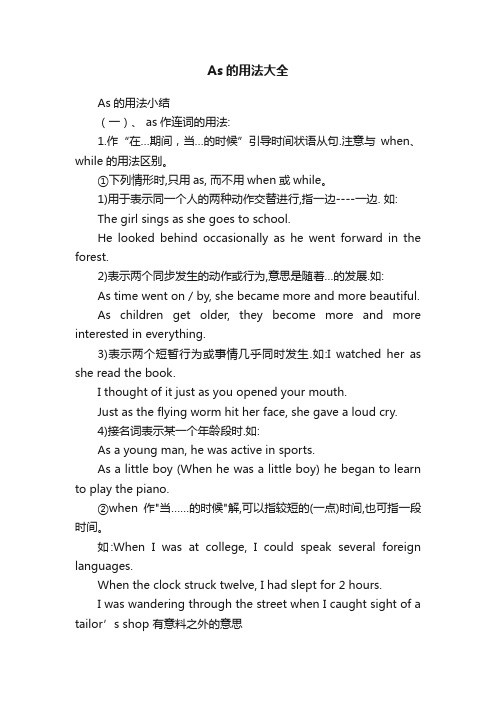
As的用法大全As的用法小结(一)、 as作连词的用法:1.作“在…期间,当…的时候”引导时间状语从句.注意与when、while的用法区别。
①下列情形时,只用as, 而不用when或while。
1)用于表示同一个人的两种动作交替进行,指一边----一边. 如:The girl sings as she goes to school.He looked behind occasionally as he went forward in the forest.2)表示两个同步发生的动作或行为,意思是随着…的发展.如:As time went on / by, she became more and more beautiful.As children get older, they become more and more interested in everything.3)表示两个短暂行为或事情几乎同时发生.如:I watched her as she read the book.I thought of it just as you opened your mouth.Just as the flying worm hit her face, she gave a loud cry.4)接名词表示某一个年龄段时.如:As a young man, he was active in sports.As a little boy (When he was a little boy) he began to learn to play the piano.②when作"当……的时候"解,可以指较短的(一点)时间,也可指一段时间。
如:When I was at college, I could speak several foreign languages.When the clock struck twelve, I had slept for 2 hours.I was wandering through the street when I caught sight of a tailor’s shop 有意料之外的意思③ while常表示一段较长的时间或一个过程,强调主句谓语动词与从句谓语动词同时如:Work while you work. Play while you play.Strike while the iron is hot趁着2. As =Since 作"既然"、"由于"解,常用来表示已为人们所知或显而易见的原因或理由。
as的用法
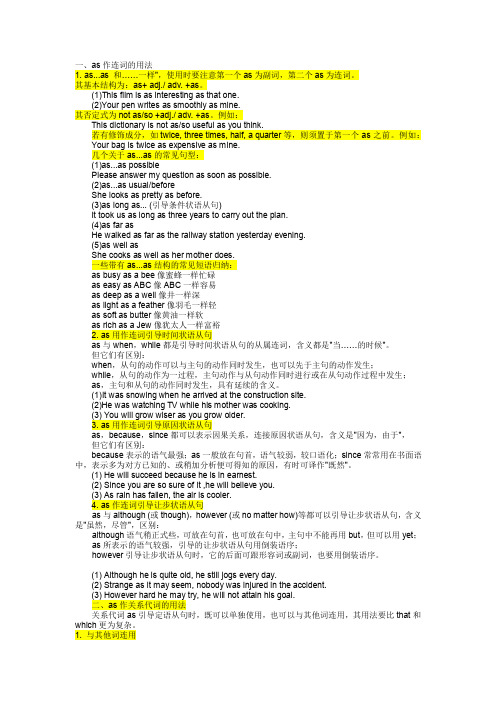
一、as作连词的用法1. as...as 和……一样",使用时要注意第一个as为副词,第二个as为连词。
其基本结构为:as+ adj./ adv. +as。
(1)This film is as interesting as that one.(2)Your pen writes as smoothly as mine.其否定式为not as/so +adj./ adv. +as。
例如:This dictionary is not as/so useful as you think.若有修饰成分,如twice, three times, half, a quarter等,则须置于第一个as之前。
例如:Your bag is twice as expensive as mine.几个关于as...as的常见句型:(1)as...as possiblePlease answer my question as soon as possible.(2)as...as usual/beforeShe looks as pretty as before.(3)as long as... (引导条件状语从句)It took us as long as three years to carry out the plan.(4)as far asHe walked as far as the railway station yesterday evening.(5)as well asShe cooks as well as her mother does.一些带有as...as结构的常见短语归纳:as busy as a bee像蜜蜂一样忙碌as easy as ABC像ABC一样容易as deep as a well像井一样深as light as a feather像羽毛一样轻as soft as butter像黄油一样软as rich as a Jew像犹太人一样富裕2. as用作连词引导时间状语从句as与when,while都是引导时间状语从句的从属连词,含义都是"当……的时候"。
AS 用法
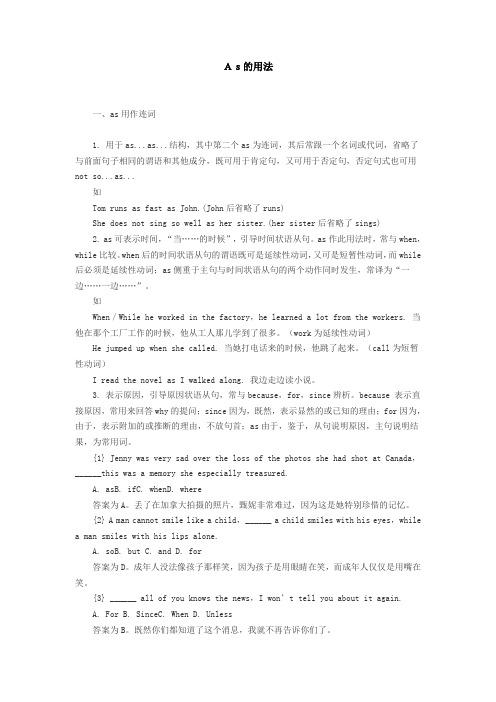
As的用法一、as用作连词1. 用于as...as...结构,其中第二个as为连词,其后常跟一个名词或代词,省略了与前面句子相同的谓语和其他成分,既可用于肯定句,又可用于否定句,否定句式也可用not so...as...如Tom runs as fast as John.(John后省略了runs)She does not sing so well as her sister.(her sister后省略了sings)2. as可表示时间,“当……的时候”,引导时间状语从句。
as作此用法时,常与when,while比较。
when后的时间状语从句的谓语既可是延续性动词,又可是短暂性动词,而while 后必须是延续性动词;as侧重于主句与时间状语从句的两个动作同时发生,常译为“一边……一边……”。
如When/While he worked in the factory,he learned a lot from the workers. 当他在那个工厂工作的时候,他从工人那儿学到了很多。
(work为延续性动词)He jumped up when she called. 当她打电话来的时候,他跳了起来。
(call为短暂性动词)I read the novel as I walked along. 我边走边读小说。
3. 表示原因,引导原因状语从句,常与because,for,since辨析。
because 表示直接原因,常用来回答why的提问;since因为,既然,表示显然的或已知的理由;for因为,由于,表示附加的或推断的理由,不放句首;as由于,鉴于,从句说明原因,主句说明结果,为常用词。
{1} Jenny was very sad over the loss of the photos she had shot at Canada,______this was a memory she especially treasured.A. asB. ifC. whenD. where答案为A。
as as的用法总结
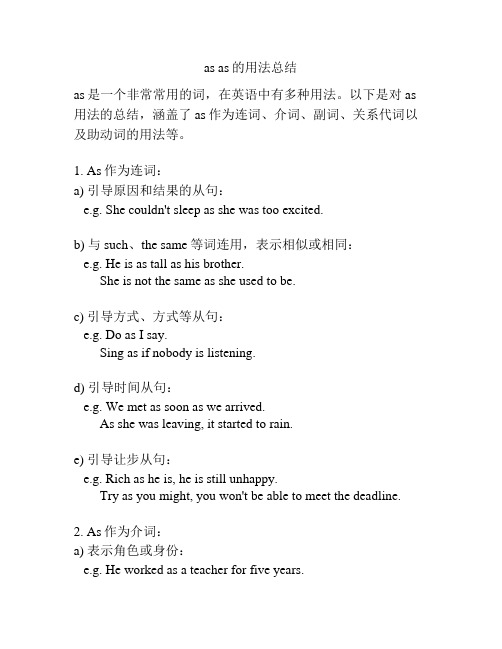
as as的用法总结as是一个非常常用的词,在英语中有多种用法。
以下是对as 用法的总结,涵盖了as作为连词、介词、副词、关系代词以及助动词的用法等。
1. As作为连词:a) 引导原因和结果的从句:e.g. She couldn't sleep as she was too excited.b) 与such、the same等词连用,表示相似或相同:e.g. He is as tall as his brother.She is not the same as she used to be.c) 引导方式、方式等从句:e.g. Do as I say.Sing as if nobody is listening.d) 引导时间从句:e.g. We met as soon as we arrived.As she was leaving, it started to rain.e) 引导让步从句:e.g. Rich as he is, he is still unhappy.Try as you might, you won't be able to meet the deadline.2. As作为介词:a) 表示角色或身份:e.g. He worked as a teacher for five years.She is regarded as a leader in her field.b) 表示原因或基础:e.g. They did it as a result of their love for each other.He joined the team as a result of his hard work.c) 表示方式、条件或比较:e.g. Traveling by train is not as convenient as traveling by car. We will accept your proposal on the condition that you make some changes.d) 表示时间:e.g. He arrived as the sun was setting.I will finish the report as soon as possible.3. As作为副词:a) 用来表示程度、程度等:e.g. She ran as fast as she could.It's not as good as I expected.b) 用来引出例子:e.g. He has many hobbies, such as swimming and playing basketball.There are many countries in Asia, such as China, Japan, and India.4. As作为关系代词:a) 引导定语从句,代替前面提到的词:e.g. The man, as I told you, is my uncle.The book, as you recommended, is very interesting.b) 引导方式状语从句,常与such相连:e.g. They did it in such a way as to attract attention.He opened the door as if nothing had happened.5. As作为助动词:a) 用于进行时态中,表示持续的动作:e.g. She was singing as I walked into the room.They were playing basketball when it started to rain.总而言之,as是一个多功能词,在英语中有作为连词、介词、副词、关系代词以及助动词等多种用法。
as的用法
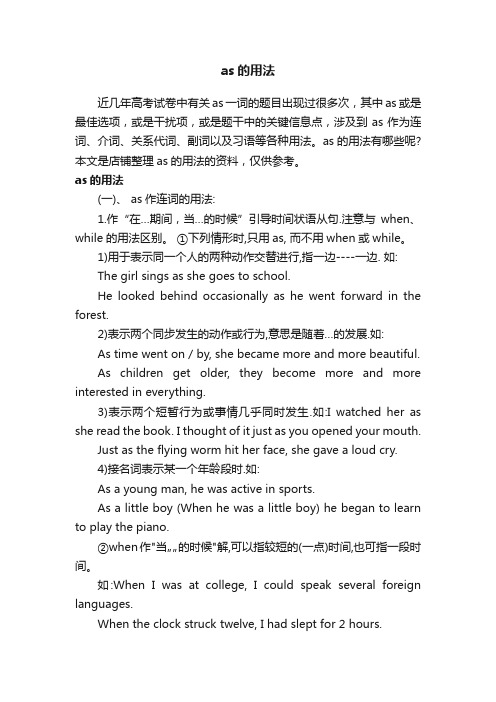
as的用法近几年高考试卷中有关as一词的题目出现过很多次,其中as或是最佳选项,或是干扰项,或是题干中的关键信息点,涉及到as作为连词、介词、关系代词、副词以及习语等各种用法。
as的用法有哪些呢?本文是店铺整理as的用法的资料,仅供参考。
as的用法(一)、 as作连词的用法:1.作“在…期间,当…的时候”引导时间状语从句.注意与when、while的用法区别。
①下列情形时,只用as, 而不用when或while。
1)用于表示同一个人的两种动作交替进行,指一边----一边. 如:The girl sings as she goes to school.He looked behind occasionally as he went forward in the forest.2)表示两个同步发生的动作或行为,意思是随着…的发展.如:As time went on / by, she became more and more beautiful.As children get older, they become more and more interested in everything.3)表示两个短暂行为或事情几乎同时发生.如:I watched her as she read the book. I thought of it just as you opened your mouth.Just as the flying worm hit her face, she gave a loud cry.4)接名词表示某一个年龄段时.如:As a young man, he was active in sports.As a little boy (When he was a little boy) he began to learn to play the piano.②when作"当……的时候"解,可以指较短的(一点)时间,也可指一段时间。
as的用法总结

as的用法总结:掌握这些技巧,让你的英语表达更流利!As是英语中常用的连词,它可以用于连接两个句子,使它们变得更连贯。
除了常见的用法,还有许多其他的用法和技巧,下面我们来一一总结。
1. 表示因果关系当表达一个事物的原因或原因与结果之间的因果关系时,我们可以使用as来连接:- As she was tired, she decided to go to bed early.(由于她很累,她决定早早睡觉。
)- As it was raining heavily, we cancelled our trip to the beach.(因为下着大雨,我们取消了去海滩的行程。
)2. 表示方式As也可以用来表示某一行为或事物的方式,即使用as + 形容词或副词的比较级:- She can cook as well as her mother.(她煮的饭菜和她妈妈一样好吃。
)- He swims as fast as a fish.(他游泳像鱼一样快。
)3. 表示时间在表示时间的时候,as可以引导时间状语从句,并表示某个动作发生在另一个动作之前:- As soon as I finish my work, I'll go to the cinema with you.(等我一完成工作,我就和你一起去电影院。
)- As I was walking home, I saw a shooting star.(当我走回家的时候,我看到了一颗流星。
)4. 表示比较与方式结构类似,as也可以用来表示比较,即as + 形容词或副词的原级:- You're as beautiful as your mother.(你像你妈妈一样美丽。
)- This coffee is as hot as lava.(这咖啡烫得都能和熔岩比了。
)总之,掌握as的用法对于英语口语和写作都是非常重要的。
希望这篇文章能够帮助你更好地理解和运用as。
- 1、下载文档前请自行甄别文档内容的完整性,平台不提供额外的编辑、内容补充、找答案等附加服务。
- 2、"仅部分预览"的文档,不可在线预览部分如存在完整性等问题,可反馈申请退款(可完整预览的文档不适用该条件!)。
- 3、如文档侵犯您的权益,请联系客服反馈,我们会尽快为您处理(人工客服工作时间:9:00-18:30)。
有关as作连词的用法一.as引导状语从句as作为连词可以引导状语从句,表示时间、原因、方式、让步等。
1. 引导时间状语从句,意思是“当``````的时候”,同when/while,更强调“一边``````一边``````”。
表“随着``````”的意思时同with,但with是介词,不可以跟从句。
eg: I saw him as he was getting off the bus.He often listens to the music as he is doing his homework.As time goes by, his illness is getting worse.2. 引导原因状语从句,同since。
eg: We had better hurry as it is getting dark.As she has no car, she can’t get there easily.有关as作连词的用法一.二.as引导定语从句1. as引导限制性定语从句。
as作为关系代词可以引导限制性定语从句,通常与the same或such连用,构成the same ``````as和such``````as句型。
eg: I have never heard such stories as he tells.This is the same dictionary as I lost.有关as作连词的用法要用倒装结构。
可以把从句中表语、状语甚至谓语动词置于句首,如果是带有冠词的可数名词单数作表语,置于句首时应省去冠词。
eg: Young as he is, he knows a lot about history.Much as I like you, I will not marry you.Try as she might, Mary couldn’t get the door open.Boy as he is, he is very shy. (boy前省略冠词a)4. 引导方式状语从句,表示方式。
意思是“像,按照,如同”。
eg: Do it as I do it.You should finish your task as you are told to.Leave it as it is.有关as作连词的用法2. as引导非限制性定语从句。
as与which一样都可以引导非限制性定语从句,但是as引导的从句可以放在主句之前、主句之后,甚至还可以分割主句;而which引导的非限制性定语从句只能放在主句之后。
另外as还有“正如、就像”之意。
eg: As is mentioned above, the number of the students in senior high schools is increasing.He was admitted to college, which made his parents very happy.John, as you know, is a writer.动词不定式动词不定式是非谓语动词的一种,它没有人称和数的变化,在句子中不能独立作谓语,但它仍保持动词的特点,既可以有自己的宾语和状语。
动词不定式的构成:to+动词原形动词不定式作主语动词不定式作主语时句子有以下两种(1)把不定式置于句首。
如:To get there by bike will take us half an hour.(2)用it作形式主语,把真正的主语不定式置于句后It will take us half an hour to get there by bike.常用句式有①It+be+名词+to doIt‘s our duty to take good care of the old.②It takes sb+some time+to doHow long did it take you to finish the work?③It+be+形容词+for sb+to doIt is difficult for us to finish writing the composition in a quarter of an hour.④It seems+形容词+to doIt seemed impossible to save money动词不定式作宾语后面能接不定式作宾语的动词有:agree, ask, choose,decide, forget, hope, learn, want, wish, would like等。
如:We hope to get there before dark. 我们希望天黑以前到那儿。
The girl decided to do it herself. 那个姑娘决定自己做那件事。
动词不定式作宾语的注意事项(2点)1.有些动词既可跟不定式作宾语,也可跟动名词作宾语,但含义不同:remember to do 记住要做某事;remember doing 记得曾经做过某事forget to do忘记要做某事forget doing 忘记曾经做过某事stop to do 停下来去做某事stop doing 停止做某事go on to do 继续做另一件事go on doing 继续做原来在做的事I remember seeing you somewhere before.我记得以前在哪儿见过你。
Please remember to turn off the light when you leave.离开时请记得关好灯。
2.不定式作宾语时,如带有宾语补足语,则要把不定式放到后面,用it作形式宾语,构成“主语+动词+it+宾补(形容词、名词)+不定式”结构。
如:He found it very difficult to get to sleep.他发现很难入睡。
动词不定式作宾语补足语1.后面能接to不定式作宾语补足语的动词有:ask, order, teach, tell, want, wish, help 等。
The teacher told us to do Exercise 1.老师要我们做练习一。
I want both of you to go.我要你们俩去。
We helped her (to) repair her bike.我们帮助她修理自行车。
2.使役动词let, have, make及感官动词see, watch, notice, hear, feel等要以不带to 的不定式作宾补。
Let’s have a rest. 我们休息一会吧。
I saw him come in. 我看见他进来了。
感官动词后既可跟不带to的不定式作宾补,也可跟v-ing作宾补,前者表示动作的全部过程已结束;后者表示动作正在进行。
I saw him come downstairs.我看见他下了楼。
(说明他下楼了这件事)I saw him coming downstairs.我看见他在下楼。
(说明他下楼时的情景)动词不定式作定语1、不定时要放在所修饰的名词、代词之后。
Would you like something to eat?He has a important meeting to have.2、如果动名词与所修饰的名词与代词之间构成逻辑上的动宾关系,因此若不定式的动词是不及物动词时要加上相应的介词They want a big room to live in.动词不定式作表语动词不定式作表语的语法功能,在初中阶段不作为考查项目,但是往往会在完形填空或阅读理解中出现,所以对此有多了解会有助于你的阅读能力。
动词不定式放在系动词之后作表语;My job is to clean the street every day.His dream Is to be a doctor动词不定式作状语1. 作目的状语He ran fast to catch the first bus.He came here only to say goodbye to us.2. 作结果状语He searched the room to find nothing.3. 作原因状语I’m glad to see you.特殊疑问词与动词不定式连用特殊疑问词+To do 往往与宾语从句相互转I don’t know what to do.=I don’ t know what I should do.类似的疑问词还有when, where, whom, which, how动词不定式的否定形式动词不定式的否定式是在to前加not;不带to的不定式则在动词前加not. 如:Zhang Ming asked me not to stay at home all day.张明要我不要整天呆在家里。
My mother let me not do it by myself.妈妈让我不要独自做这件事。
To 的几种常见用法too…to… / not +adj.+enough to do…He is too careless to finish the work well.He is not careful enough to finish the work well.He is so careless that he couldn't finish it well.He is such a careless boy that he couldn't …be to do…表示按照计划或者安排将要发生的动作used to do …表示过去常常干某事have to do…不得不作某事同步练习1. We want to play basketball after school. Would you like __________ (join) us?2. Meimei likes English very much. She does her best _______ (learn) English well.3. It is better to teach a man fishing than ______ (give) him fish.4. Though Tom missed many lessons, he tried hard __________ (not fall) behind.5. The little boy _____________ (ask) to do his homework just now.6. Never forget ________ (say) “Excuse me”, when you trouble somebody.7. Who told the man _______ (not be) late for school?8. So much work usually makes them ______ (feel) very tired.9. Let’s go and ______ (play) games.10. They will spend their holiday in Guilin, but we haven’t decided where _____ (go).倒装句种种一.正常词序1. The accident happened late in the afternoon. (绝大部分陈述句)2. What has happened to you?(疑问词作主语的特殊疑问句)3. Which building was destroyed?(疑问词修饰主语的特殊疑问句)二. 倒装词序1. 主谓倒装A. 部分倒装(即一般疑问句词序)Did the accident happen late in the afternoon?B. 全部倒装Out rushed the woman.2. 非主谓倒装Proud as/though he is, he is afraid to see me. (表语倒装)=Though he is proud, he is afraid to see me.三. 主谓倒装A. 部分倒装(主谓像一般疑问句那样倒装)1. 疑问句(疑问词作主语或作主语的修饰语除外)( The bell has rung. )1) Has the bell rung?( Everything he had was taken away from him during the Second World War.)2) When was everything he had taken away from him?2. “ Only + 状语” 放在句首时(He told me the truth only after his wife left.)Only after his wife left did he tell me the truth.3. 当not only … but also …连接两个句子时,前一句主谓要部分倒装(The city was polluted and the streets were crowded, too.)Not only was the city polluted but also the streets were crowded.4. so (表示“如此……”)放在句首时( I felt it so difficult to live in an English-speaking country that I was determined to learn English well.)So difficult did I feel it to live in an English-speaking country that I was determined to learn English well.5. so (表示“也……”)放在句首时; nor / neither (表示“也不…….”)放在句首时(Smelling a rotten egg is an experience and taking medicine is an experience, too.)1) Smelling a rotten egg is an experience. So is taking medicine.(I have never been abroad and my wife has never been abroad, either. )2) I have never been abroad. Nor has my wife.注意:1) 加前缀或后缀( un__, im__, __less等)视为肯定句.( The young man was impolite to us. His father was impolite to us, too.)The young man was impolite to us and so was his father.2) “So + 主谓部分倒装” 表示“……也……” ;“So + 主谓不倒装” 表示“的确……”If he goes to see you off at the airport, so will I.(= I will go to see you off at the airport, too)---- I hear Tom sat up far into the night.---- So he did.6.当否定词、半否定词或否定词组放在句首时( He no more cared what his friends thought about him. )1) No more did he care what his friends thought about him.He wasn’t set f ree until liberation. )2) Not until liberation was he set free.( He had hardly gone to bed when the telephone rang )3) Hardly had he gone to bed when the telephone rang.( They cleaned the entire house in no time. )4) In no time did they clean the entire house .TV sets can never take the place of cinemas.)5) Never can TV sets take the place of cinemas.(She did not sing a single song at yesterday’s party.)6) Not a single song did she sing at yesterday’s party.7. 虚拟条件从句中含有should, were 或had时,可以去掉if, 主谓进行部分倒装.(If I had been born a few years earlier, I would join the army.)1) Had I been born a few years earlier, I would join the army.( Your wife would not be pleased to hear that if she were here now. )2) Your wife would not be pleased to hear that were she here now.B. 全部倒装1. 以There / Here / Out / In / Away / Up / Down开头的句子1) Here is a letter for you.3) There goes the bell.4) There was a sudden wind and away went his hat.5) The door burst open and in rushed the crowd.但是:当主语是人称代词时,主谓不要倒装.1) Here it comes.2) Here they are.3) Out she rushed.3. 一个较长的地点状语短语放在句首时,如果主语长,谓语短,需要全部倒装.1) In a lecture hall of a university in England sat an old professor with a heavy book under his arm.2) From the valley came a gun shot.3) They arrived at a farmhouse, in front of which stood a peasant boy.4) In this passage will be found the answer to the question.4. 当直接引语的一部分或全部放在句首时,引号外的主谓可以全部倒装,也可以不倒装.1) “I think we’re lost.” said my brother.(也可以: “I think we’re lost.” my brother said.)2) “ If I die,” asked he, “ who will take my place?”(也可以: “If I die,” he asked, “who will take my place?”)四. 非主谓倒装1. 感叹句( He is singing beautifully. )1) How beautifully he is singing ! (状语倒装)( You are all very silly. )2) How silly you all are !(表语倒装)( You’ve made so many mistakes in this exam. )3) What a lot of mistakes you have made in this exam!(宾语倒装)(I wish very much to go there.)How I wish to go there! (状语倒装)2. 为了前后衔接紧密, 将宾语倒装( 放在句首).Then they asked the king for more silk and gold thread. All this they kept for themselves.(宾语倒装)3. 当as表示”虽然”、“尽管”时,必须将表语,状语或主要动词倒装.1) Tired as they were, Alice and Jane sat up very late to see the new year come.( 表语倒装)2) Hero as he is , he has some shortcomings. (表语倒装)3) Hard as they worked, they didn’t finish the task ahead of time. (状语倒装)4) Try as you might, you will not succeed. (主要动词倒装)定于从句1. The girl _______ is sitting in the chair is a good singer.2. The skirt __________ Mary bought two years ago is old.3. Is this the novel __________ you introduced to me?4. Where is the boy _______ broke the window?5. Luckily none of the people_________I know were killed in the earthquake.•Attributive Clause(定语从句)概念在复合句中,修饰某一名词或代词的从句叫做定语从句.被修饰的名词或代词叫先行词He is an English teacher who likes singing songs引导词关系代词:who﹑whom﹑that﹑which﹑whose关系副词:where﹑when﹑why注意:1 关系代词和关系副词在定语从句中都要充当句子成分。
